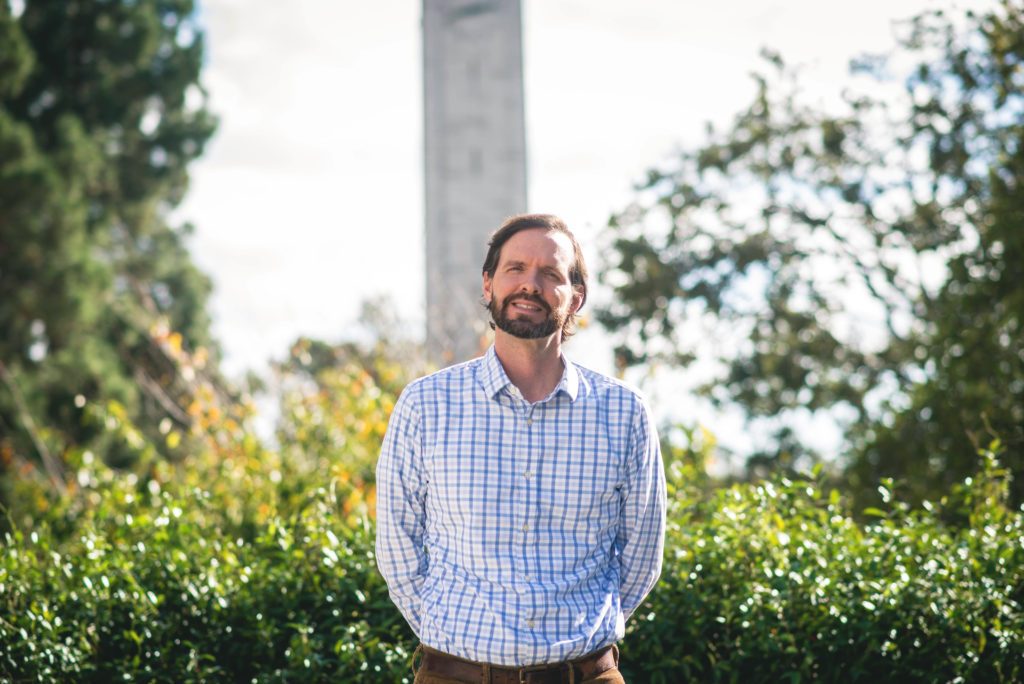The toughest crowd to impress is often the one closest to you. Colleagues share many of the same challenges — competing projects, ambitions, and timelines among them. So when Berkeley librarians join to applaud one of their own, you know it means something.
This year’s winners of the Distinguished Librarian Award are Susan Edwards, head of the Social Sciences Division, and Brian Quigley, head of the Engineering and Physical Sciences Division. “I’ve been a librarian for a long time, and am passionate about what I do,” explains Edwards. “Being honored by my peers is incredibly moving.”
The Distinguished Librarian Award is given biennially to up to two librarians recognized for their excellence by a committee of peers and faculty. The awards are administered and funded by the Librarians Association of UC Berkeley.
BRIAN QUIGLEY
In 2013, Quigley led the integration of five separate engineering and physical science (EPS) libraries into the inaugural subject division. Through the creation of this and five other divisions, over 20 subject specialty libraries have been grouped into affinity groups.
By pulling together a highly distributed workforce into larger communities, this reorganization has enhanced staff collaboration and efficiency, and has supported the streamlining and sharing of services among libraries.
A few of Quigley’s other achievements include better serving user needs by thoroughly assessing and restructuring EPS reference services, and by forming an EPS faculty library committee and a student committee to provide input on the library’s programs, outreach and acquisitions.
For Quigley, working with people is key. He derives the most satisfaction from mentoring staff, consulting with students and faculty, and collaborating with his colleagues. “When faced with difficult decisions, the staff and I often ask ‘What would Brian do?’,” explains engineering librarian Lisa Ngo.

Quigley manages the Kresge Engineering, Chemistry, Mathematics Statistics, Earth Sciences and Map, and Physics-Astronomy libraries. These serve roughly 500 faculty, 2800 graduate students, and 5000 undergraduate students in the relevant fields. Quigley is thought of as an experimenter. He frequently tries out new offerings and services based on the ideas and observations of his staff and library clients. “What we find effective is to pilot things,” he says, “and then use feedback to refine ideas and better address user needs.”
Recent pilot programs with broad student impact include joining the popular Packd app, which provides students with a real-time look at seat availability; providing an ASUC-funded REST Zone; extending the Engineering Library hours; improving student services, such as offering presentation kits for checkout, laptop lending, and more moveable whiteboards for group study; and encouraging staff in initiating their popular Maps and More series at the Earth Sciences and Map Library.
“Campus itself is such a stimulating and exciting environment,” explains Quigley. “The quality of the faculty and the caliber of the students are so inspiring. It always makes me want to be a better librarian and to serve them better.”
SUSAN EDWARDS
Susan Edwards loves the library profession because it offers “the chance to help people, together with lots of intellectual stimulation and reward.”
As division head for social sciences, she provides leadership for five libraries — Anthropology, Business, Education Psychology, Environmental Design, and Social Research. She also manages the Data Lab.
“All the social sciences disciplines are looking at how to use research to effect social change, to improve people’s lives,” explains Edwards “Information and social justice really belong together, because information is key for individuals and groups who want to change their lives.”

The most satisfying aspect of her work, she says, is working closely with students, faculty, and independent researchers. “I love helping them think through the process, and seeing their excitement when they get the information they need,” Edwards says.
After earning her M.L.I.S. at Berkeley in 1980, Edwards worked at the University Library for seven years as head of newspapers and microforms. She then went east and assumed a series of positions at the Amherst College Library.
Returning to Berkeley in 2009, Edwards was surprised at the relatively low level of entitlement among many Cal students. “It’s more about creating an environment where we’re teaching students that they can expect more support,” she explained. “Yes, they do deserve an hourlong appointment to get help with their research!”
She adds, “I love being at a public research university that’s committed to diversity and equity. We represent a pathway to mobility for many of our students, and their commitment to service inspires me. I feel lucky to be here.”
One of Edwards’ recent achievements was the process of combining three different libraries’ collections — Education, Psychology, and Social Welfare — into the Social Research Library. To help pare down and combine the materials, Edwards studied dissertation citations and noted the types of resources the three units’ students were using most. Faculty and students served by the new Social Research Library consider the transition a real success.
To build intellectual community, Edwards has launched a series of popular book talks at the library that draw faculty, students, alumni and community members. The gatherings are reinvigorating the Social Research Library as a center of learning and interaction.
“This is such an exciting time to be a librarian at Berkeley,” Edwards reflects. “Because of the far easier access to information through technology, a library’s traditional roles are now only one part of the suite of services needed. So we are rethinking the role of the library more broadly, and how it affects the life of scholarship and discovery on campus.”
Reflecting on Susan’s many contributions to the academic vitality at Berkeley, psychology professor Stephen Hinshaw noted her creativity and leadership. “Indeed, I wasn’t prepared for what a librarian in the UC system could do!”